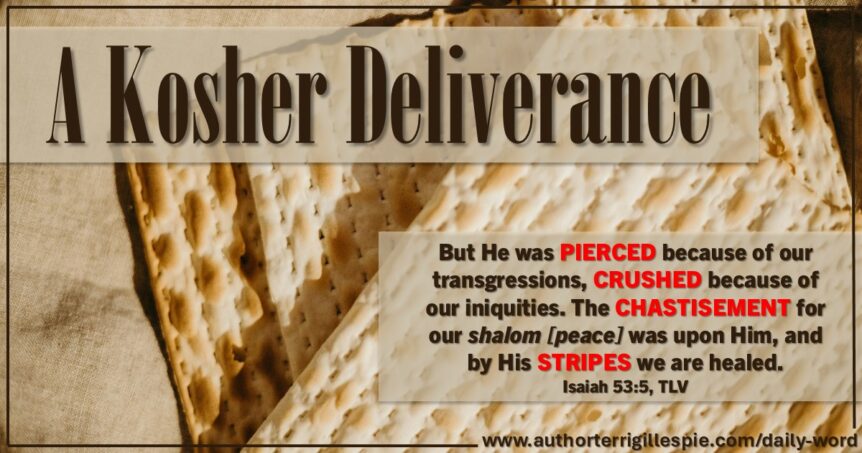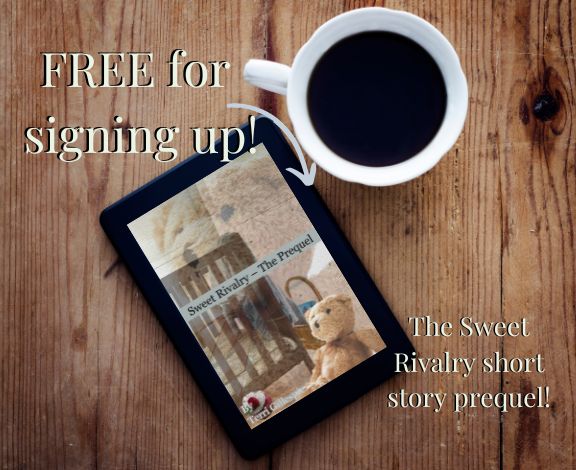But He was PIERCED because of our transgressions,
CRUSHED because of our iniquities.
The CHASTISEMENT for our shalom [peace] was upon Him,
and by His STRIPES we are healed. Isaiah 53:5, TLV
 A Kosher* Deliverance. Shabbat Shalom and Chag Semeach! At sundown tomorrow, the Feast of Passover will begin (Leviticus 23:4-8) followed by the Feast of Matzah (Unleavened Bread) for seven days. Observant believers in Yeshua (Jesus) along with other Jewish souls will remove anything from their homes that contain yeast or any rising agents. They will eat only foods without leaven during these two festivals.
A Kosher* Deliverance. Shabbat Shalom and Chag Semeach! At sundown tomorrow, the Feast of Passover will begin (Leviticus 23:4-8) followed by the Feast of Matzah (Unleavened Bread) for seven days. Observant believers in Yeshua (Jesus) along with other Jewish souls will remove anything from their homes that contain yeast or any rising agents. They will eat only foods without leaven during these two festivals.
Our family celebrates Passover and the Feast of Unleavened Bread, and like our brothers and sisters in Israel. (Although, after 25 years of celebrating, we use less and less leaven.)
Passover Matzah vs. “Regular” Matzah
Have you ever visited the Kosher/Jewish section of your local grocery store? One can buy matzo/matzah or unleavened bread all year long. But Passover matzah is different than regular matzah.
They are to eat the meat that night, roasted over a fire. With matzot [plural for matzah] and bitter herbs they are to eat it. (Exodus 12:8, TLV, notation mine)
According to Rabbinic instructions, Passover matzot must have four qualities:
- Only ingredients flour and water: No leavening agents such as yeast, baking soda or baking powder, etc.
- Made quickly: Did you know even without leavening agents, flour and water will rise on its own by 18 minutes. Kosher matzot must be mixed and kneaded and formed within 10 seconds.
- Pierced: all matzot have holes, however matzot kosher for Passover must be pierced completely through. When lifted to the light, you could see through the piercing.
- Striped: Baked in a 500-degree oven or over fire gives the matzah its distinctive striping marks.
Compelling similarities to our Messiah’s torture and death, wouldn’t you say?
wouldn’t you say?
Get rid of the old hametz [leaven], so you may be a new batch, just as you are unleavened—for Messiah, our Passover Lamb, has been sacrificed. Therefore, let us celebrate the feast not with old hametz, the hametz of malice and wickedness, but with unleavened bread—the matzah of sincerity and truth. (1 Corinthians 5:7-8, TLV)
The context of Paul’s message to the believers in Corinth is that they were caught in the sins of sexual immorality, idolatry, greed . . . well, you get the idea, sin. Paul refers to hametz as a representation of sin—an ancient understanding from the Torah. Paul explains that our Passover Lamb was sinless, without hametz — leaven.
Then the governor’s soldiers took Yeshua into the Praetorium and gathered the whole cohort around Him. They stripped Him and put a scarlet robe around Him. And after braiding a crown of thorns, they placed it on His head and put a staff in His right hand. And falling on their knees before Him, they mocked Him, saying, “Hail, King of the Jews!” They spat on Him, and they took the staff and beat Him over and over on the head. (Matthew 27:27-30, TLV)
Jesus took brutal beatings from the time He was “captured” in the Garden. His body was striped with His blood. The scourging was unbearable. But because this was the reason He came — to atone for our sins — He bore it.
 Imagine, the same Yeshua that healed, calmed seas, delivered people from demons, and raised the dead just stood and took it.
Imagine, the same Yeshua that healed, calmed seas, delivered people from demons, and raised the dead just stood and took it.
But one of the soldiers pierced His side with a spear, and immediately blood and water came out. (John 19:34, TLV)
His body was pierced as proof of Yeshua’s death.
“Then I will pour out on the house of David and the inhabitants of Jerusalem a spirit of grace and supplication, when they will look toward Me whom they pierced. They will mourn for him as one mourns for an only son and grieve bitterly for him, as one grieves for a firstborn.” (Zechariah 12:10, TLV)
All of the Biblical Feasts (Leviticus 23) were intended as reminders of the LORD’s mercy and miracles. They were also prophetic signposts to the coming Messiah and all He would do. As the Heavenly Father’s redeemed children, celebrating these Biblical Feasts creates profound opportunities to remind our children and grandchildren of thousands and thousands of years of His workings in the lives of His children. In fact, they were lesson plans for us to teach others — and ourselves — of the wonder of our Creator.
as reminders of the LORD’s mercy and miracles. They were also prophetic signposts to the coming Messiah and all He would do. As the Heavenly Father’s redeemed children, celebrating these Biblical Feasts creates profound opportunities to remind our children and grandchildren of thousands and thousands of years of His workings in the lives of His children. In fact, they were lesson plans for us to teach others — and ourselves — of the wonder of our Creator.
Sundown tomorrow begins Passover but tonight begins the Feast of Shabbat — the Sabbath (Leviticus 23:1-3). Tonight, we celebrate our rest and peace (Hebrews 9). As we prepare to celebrate our rest, may we remember Isaiah 53, and all that our Messiah accomplished on our behalf — for our shalom — and live a “leaven-free” life.
Shabbat shalom.
Think More About It
Have you ever thought about celebrating the Biblical Feast of Passover? Do you currently celebrate this Feast? I would love to hear your thoughts?
May we remember.
[Praying for Israel—Prayer Prompt
When Israel came out of Egypt,
Jacob’s house from a people foreign-speaking,
Judah became His Sanctuary,
Israel His dominion.
The sea saw and fled,
the Jordan turned back. Psalm 114:1-3, TLV
Psalm 114 is considered a song of Passover. I encourage you to pray the chapter—it’s short. An important component to worship is remembering—remembering what God has done for us. Let’s remember together on behalf of Israel. Amen? God bless you. Shabbat shalom and Chag semeach.
*Kosher foods are those foods that conform to the Jewish dietary regulations of kashrut (dietary law), the Jewish dietary law is primarily derived from Leviticus 11 and Deuteronomy 14:1-21, but over the years more stringent rules were added to the Scripture instructions.



